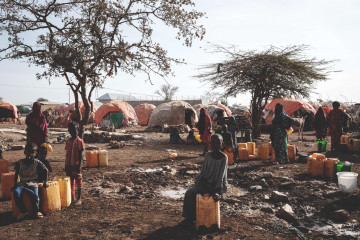

Famine is bearing down on Somalia as clinics for malnourished children are close to breaking point.
"Children are dying now and we're in a race to stop that from happening," said Mohamud Mohamed Hassan, Save the Children's country director.
"The world is sleepwalking towards another catastrophic famine of the sort we promised would never happen again."
"The number of Somali children receiving treatment for the most dangerous form of malnutrition has surged 300% in the first six months of 2022"
The number of Somali children receiving treatment for the most dangerous form of malnutrition has surged 300% in the first six months of 2022 as the worst drought in years tightened its grip on the country
About 7.1 million Somalis – nearly half the population – are battling hunger, with more than 200,000 on the brink of starvation, according to UN figures.
Somalia and its neighbours in the Horn of Africa including Ethiopia and Kenya are experiencing the worst drought in more than 40 years following four failed rainy seasons that have decimated crops and livestock.
But aid agencies say there is a dire lack of international funding for Somalia, with calls for donations so far raising less than 30% of the estimated $1.46 billion needed to tackle the crisis.
Some 386,000 children face severe malnutrition.
In June, doctors at a healthcare facility for children in Baidoa, southwest Somalia, run by Save the Children, treated a record 471 children suffering from severe acute malnutrition with other medical complications – four times more patients than in January.
"Famine is bearing down on Somalia and clinics for malnourished children are close to breaking point. Children are dying now and we're in a race to stop that from happening"
Doctors said they were witnessing first-hand how a changing climate is fuelling a catastrophic hunger crisis. Dr Farhiyo Mohamud Abdirahman has treated malnourished children at a stabilisation centre in Baidoa for more than two years and now works overtime regularly to cope with the increase in the number of patients.
“We’re facing a lot of new challenges compared to even two to three months ago. We don’t have enough beds, there are not enough rooms, and staff are working overtime,” said Dr Farhiyo Mohamud Abdirahman. “We are being pushed to our limits.”
In the first half of 2022, Dr Farhiyo Mohamud Abdirahman and her team treated 1,435 children for severe acute malnutrition, about 25% more patients than the whole of 2021. The health centre recently had to install two medical tents in its courtyard to accommodate the surge in demand for malnutrition treatment.
So far this year, 22 children have died at the centre, compared to 23 for all of 2021.
The drought has also forced more than 800,000 people to flee their homes in search of help since January 2021, according to UN figures.
As drought continues to devastate large swathes of the country, the number of children dying from malnutrition is also skyrocketing. The stabilisation centre recorded 18 deaths in June, more than double the number from May and the highest figure at any other point in the past 12 months. Nearly 90% more children died from malnutrition at the centre in the first six months of 2022 than in the same period last year.
Some aid groups are warning that the crisis could be worse than the 2011 famine in Somalia that killed 260,000 people, half of them children under the age of six.
East Africa also endured a severe drought in 2017 but early humanitarian action averted a famine in Somalia.
One of the poorest countries on the planet, Somalia is plagued by the effects of climate change and has been badly affected by the war in Ukraine that has hit global grain supplies and sent prices of basic foods and fuel soaring.




 Follow the Middle East's top stories in English at The New Arab on Google News
Follow the Middle East's top stories in English at The New Arab on Google News


